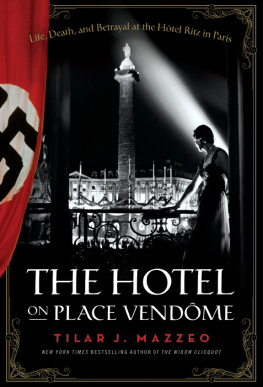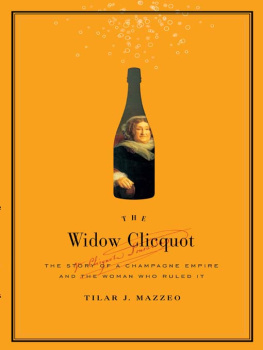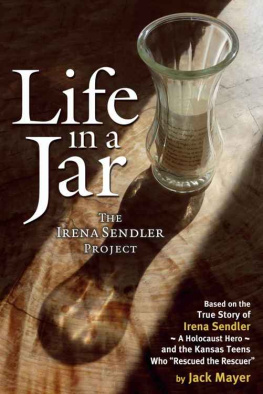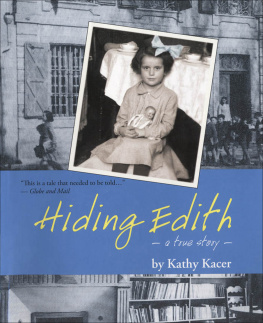ALSO BY TILAR J. MAZZEO
The Widow Clicquot: The Story of a Champagne Empire and the Woman Who Ruled It
The Secret of Chanel No. 5: The Intimate History of the Worlds Most Famous Perfume
The Hotel on Place Vendme: Life, Death, and Betrayal at the Htel Ritz in Paris
ALSO BY MARY CRONK FARRELL
Pure Grit: How American World War II Nurses Survived Battle and Prison Camp in the Pacific

MARGARET K. McELDERRY BOOKS
An imprint of Simon & Schuster Childrens Publishing Division
1230 Avenue of the Americas, New York, New York 10020
www.SimonandSchuster.com
The views or opinions expressed in this book, and the context in which the images are used, do not necessarily reflect the views or policy of, nor imply approval or endorsement by, the United States Holocaust Memorial Museum, Yad Vashem, or any other content licensor.
Text copyright 2016 by Tilar Mazzeo
Young Readers Edition adaptation copyright 2016 by Tilar Mazzeo
Illustrations copyright 2016 by Shana Torok
Hand-lettering by Shana Torok
All rights reserved, including the right of reproduction in whole or in part in any form.
MARGARET K. M C ELDERRY BOOKS is a trademark of Simon & Schuster, Inc.
For information about special discounts for bulk purchases, please contact Simon & Schuster Special Sales at 1-866-506-1949 or .
The Simon & Schuster Speakers Bureau can bring authors to your live event. For more information or to book an event, contact the Simon & Schuster Speakers Bureau at 1-866-248-3049 or visit our website at www.simonspeakers.com.
Book design by Lauren Rille
The text for this book was set in Adobe Garamond Pro.
Library of Congress Cataloging-in-Publication Data
Names: Mazzeo, Tilar J., author. | Farrell, Mary Cronk, author. | Torok, Shana, illustrator.
Title: Irenas children : a true story of courage by Tilar J. Mazzeo / adapted by Mary Cronk Farrell.
Description: Young readers edition. | New York : Margaret K. McElderry Books, [2016] | Includes bibliographical references and index.
Identifiers: LCCN 2016004169 (print) | LCCN 2015051244 (eBook) | ISBN 978-1-4814-4991-5 (hardcover : alk. paper) | ISBN 978-1-4814-4993-9 (eBook) | ISBN 978-1-4767-7850-1 (hardcover : alk. paper) | ISBN 978-1-4767-7852-5 (eBook)
Subjects: LCSH: Sendlerowa, Irena, 19102008Juvenile literature. | Righteous Gentiles in the HolocaustPolandBiographyJuvenile literature. | World War, 19391945JewsRescuePolandJuvenile literature. | Holocaust, Jewish (19391945)PolandJuvenile literature. | Jewish children in the HolocaustPolandWarsawJuvenile literature. | JewsPolandWarsawHistory20th centuryJuvenile literature. | World War, 19391945PolandWarsawJuvenile literature. | Warsaw (Poland)BiographyJuvenile literature.
Classification: LCC D804.34.M39 2016 (print) | LCC D804.66.S46 M29 2016 (eBook) | DDC 940.53/18092dc23
LC record available at http://lccn.loc.gov/2016004169
For Addie and Xavi, Eddie and Rory, who would always be brave


Contents


In her native Poland, Irena Sendler is a famous heroine today. But it took a long time for her to become famous. Her story, like so many stories across Poland, was quietly buried for decades. The Soviets, who occupied Poland after the end of the Second World War, didnt want people to tell each other stories about the bravery and courage of people who had fought to make Poland independent. It might encourage other Polish people to want to fight again for their freedom. In the 1980s, things finally started to change in Poland, and there was a new movement known as Solidarnosolidarity. As Solidarno took hold of peoples imaginations across the world, things happened so quickly many couldnt believe the changes. Eventually, thanks to solidarity and changes around the world, even the Berlin Wall, which kept people in the east apart from people in the west, was dismantled while crowds from around the globe cheered. The Soviet Union also disappeared as a country. And suddenly, for the first time in decades, it was safe to tell some of the stories of brave and amazing people in Poland like Irena Sendler and her friends, who risked their lives during the Second World War to help save Jewish families and, especially, Jewish children and teenagers.
With her friends, Irena Sendler smuggled infants out of the Warsaw ghetto, past German guards and Jewish police traitors, in suitcases and wooden boxes. She carried toddlers and school children through the citys foul and dangerous sewers. Some of the kids hid underneath the corpses of dead bodies in coffins in order to get past the guardspeople history calls the Naziswho wanted to kill them. She worked with Jewish teenagersmany of them astonishingly brave girls and boys of fourteen or fifteenwho helped her smuggle little children out of the ghetto. Many also later fought and died in the ghetto uprising. And, through it all, she and her friends spent the war hiding and taking care of thousands of children.
Irena was a small person, but she had a gigantic heart. She was a four-foot-eleven-inch tall wisp of a young woman, in her late twenties when the war began, and she didnt have any experience in battles or in fighting. But faced with a situation she knew was wrong, Irena was determined to stand up to bullying and to take action to do what she believed in, and she learned quickly. Irena fought with all her ferocity and intelligence. Soon she was acting like an experienced general. Her foot soldiers and her army were dozens of ordinary people, across the city of Warsaw, who agreed to help hide children from the Nazis and to save them.
Before she was arrested and threatened with execution for her actions, Irena Sendler and her friends saved the lives of more than two thousand Jewish children. At immense risk she also did something ever more courageous. Irena and her friends kept a list of the childrens names so that after the war their parents could find them. Many of the childrens parents did not survive the war and died in the great killings of the Holocaust. But thousands of Irenas children survived, and many of them went on to become mothers and fathers. None of them ever forgot the bravery of the woman who helped save them.
But, while Irena Sendler was undeniably a heroinea woman of immense, almost unimaginable courageshe hated being called a hero. Heroes, she said, do extraordinary things. What I did was not an extraordinary thing. It was normal. It should have been normal, is what Irena meant when she said that. If everyone had dared to stand up for what was right, something terrible might not have happened.
Not everyone in Poland had the courage to stand up to the Nazis. Most people werent brave. But Irena wasnt alone either. Dozens of people quietly joined her. Irena said that for each child whose rescue she organized, ten people in Warsaw risked their lives to help in the mission. For those who helped Irena, the choices were monstrous. Punishment for helping a Jew meant having your whole family killed in front of you. Yet not once did any of these peopledozens of themflinch from helping Irena in her mission. No one, Irena once said, ever refused to take in one of her children.
Next page









